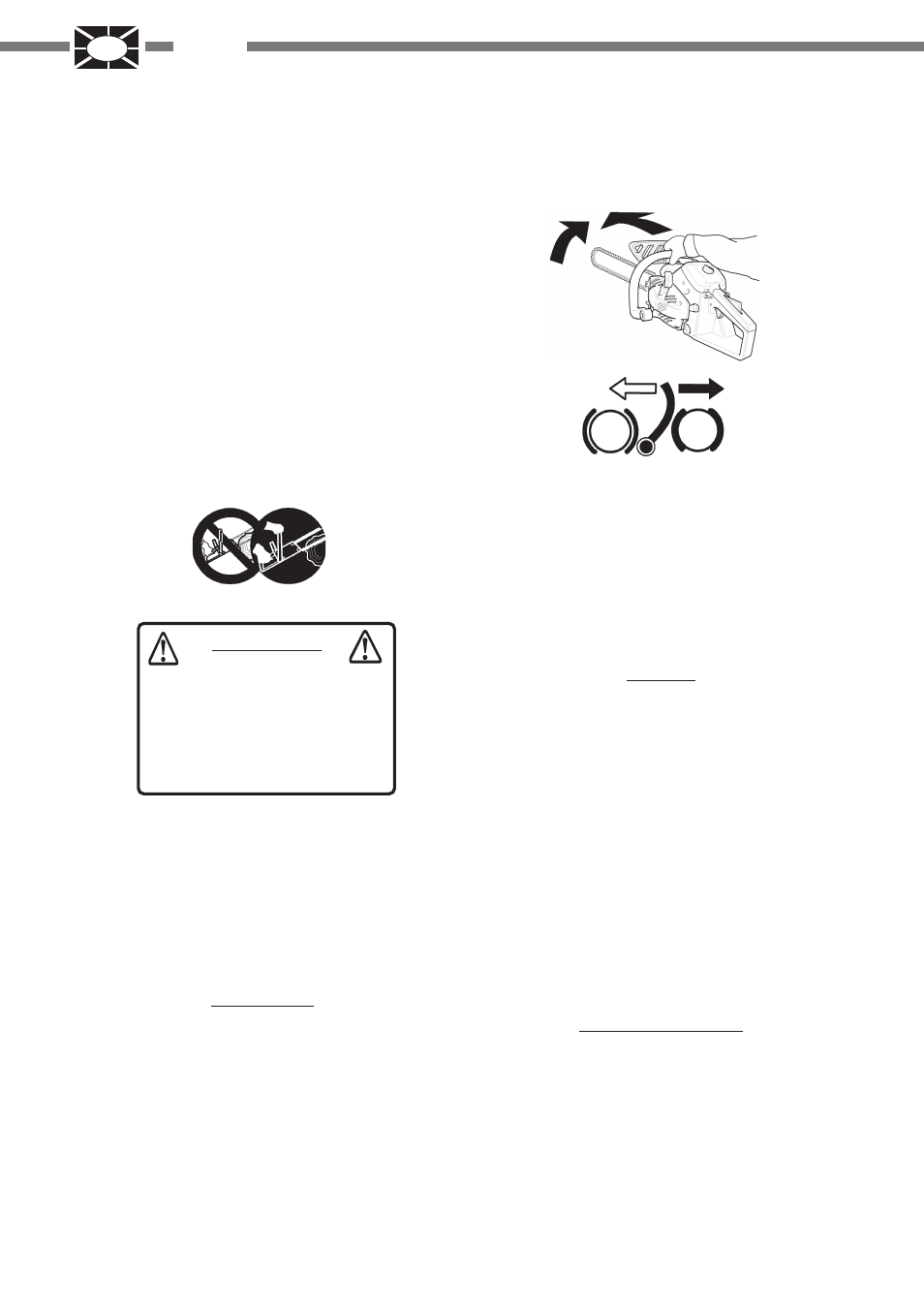Warning – IBEA 4000 Series User Manual
Page 24

ENGLISH
24
GB
5. Do not operate a chain saw with one hand! Serious
injury to the operator, helpers or bystanders may result
from one-handed operation. For proper control, always
use two hands when operating a chain saw, one hand
which operates the trigger. This can result in the chain
saw “skating” or skidding, which can result in personal
injury due to loss of control.
6. Keep a good firm grip on the saw with both hands, with
the right hand on the rear handle and the left hand on
the front handle, when the engine is running. Use a
firm grip with thumbs and fingers encircling the chain
saw handles. A firm grip will help you reduce kickback
and maintain control of the saw. Two hands must be
used to control the saw at all times.
7. Do not overreach or cut above chest height.
8. Make sure that the area in which you are cutting is
free from obstructions. Do not let the bar nose contact
a log, branch, or any other obstruction which could be
hit while you are operating the saw.
9. Cutting at high engine speeds may reduce the likelihood
of kickback.
5.
WARNING
KICKBACK MAY OCCUR WHEN
THE NOSE OR TRIP OF THE GUIDE
BAR TOUCHES AN OBJECT OR
WHEN THE WOOD CLOSES IN
AND PINCHES THE SAW CHAIN IN
THE CUT
10. But cutting at part-throttle or low engine speeds may
be preferable to control the chain saw in tight situations
and may also reduce the likelihood of kickback.
11. Follow manufacturer’s sharpening and maintenance
instructions for the saw chain.
12. Use only replacement guide bar and chains specified
by the manufacturer, or the acceptable equivalents of
these guide bar and chains.
CHAIN BRAKE
The chain brake’s function is to stop chain rotation after a
kickback. It neither prevents nor reduces kickback. Do
not depend on the chain brake for protection against
kickback.
Even with a chain brake, depend on your own good sense
and proper cutting methods just as though there were no
chain brake.
Even with normal use and proper maintenance, the
response time of the brake may lengthen. The following
may interfere with the brake’s ability to protect the operator.
1. Saw wrongly held too close to operator’s body. Kickback
time may be too fast even for a perfectly maintained
brake to work in time.
2. The operator’s hand may not be in position to contact
the hand guard. The brake will not be tripped.
3. Lack of proper maintenance lengthens the brake’s
stopping time, making it less effective.
4. Dirt, grease, oil, pitch, etc. getting into the working
parts of the mechanism may lengthen the stopping time.
5. Wear and fatigue of the activating brake spring, and
wear of the brake/clutch drum and pivot points may
lengthen the brake’s stopping time.
6. A damaged hand guard and lever may render the brake
inoperative.
INJURIES
It is believed that overusing the muscles and tendons of
the fingers, hands, arms and shoulders may cause
soreness, swelling, numbness, weakness and extreme
pain to the areas just mentioned. To reduce the risk of
repetitive stress injury, do the following.
1. Avoid using your wrist in a bent, extended or twisted
position. Instead, try to maintain a straight wristposition.
Also, when grasping, use your whole hand, not just
the thumb and index finger.
2. Take periodic breaks to minimize repetition and rest
your hands.
3. Reduce the speed and force in which you do the
repetitive movement.
4. Do exercises to strengthen the hand and arm muscles.
5. See a doctor if you feel tingling, numbness or pain in
the fingers, hands, wrists or arms.
VIBRATION AND COLD
Exposure to cold and vibration may cause tingling and
buming followed by loss of color and numbness in the
fingers. We strongly recommend your taking the following
precautions because the minimum exposure which might
trigger the ailment is unknown.
1. Keep your body warm, especially the head and neck,
feet and ankles, and hands and wrists
2. Maintain good blood circulation by performing vigorous
arm exercises during frequent work breaks and also
by not smoking.